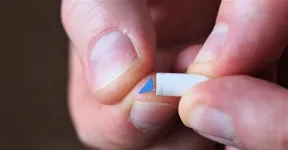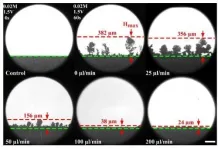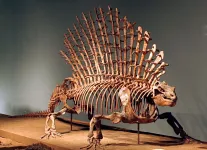Placebo effect may explain reported benefits of psychedelic microdoses
The largest placebo-controlled trial of psychedelics to date suggests that the reported psychological benefits of microdosing are likely explained by the placebo effect
2021-03-02
(Press-News.org) Positive psychological effects associated with taking small doses of psychedelic drugs are likely the result of users' expectations, suggests a study published today in eLife.
The study - the largest placebo-controlled trial on psychedelics to date - used an innovative 'self-blinding citizen science' approach, where members of the public who were already microdosing implemented their own placebo control following online instructions. The results from the trial may influence future studies in real-world settings.
There has been renewed interest in studying whether psychedelic drugs may be a useful treatment for depression, addiction, obsessive-compulsive disorders and other conditions. Few small studies have previously suggested that microdoses - small doses of psychedelic drugs taken one to three times a week - may improve people's wellbeing, creativity and overall cognitive performance. But many of the studies lack a control group of participants taking a dummy pill to determine if these positive outcomes are the result of the drug's action, or the result of the participants' expectations of a benefit - the so-called placebo effect. "Anecdotal reports about the benefits of microdosing are almost certainly biased by the placebo effect," says lead author Balázs Szigeti, a research associate at Imperial College London, UK.
Szigeti and his colleagues designed a citizen science study where individuals who were already microdosing could participate online. First, the 191 participants followed a setup procedure that mixed placebo pills with microdose ones. After the setup, the participants had a set of capsules without knowing which were placebo and which were microdose. The authors call this process 'self-blinding', as participants lost knowledge of which drug they were taking. The setup included barcodes which, when scanned, linked to the study's IT infrastructure and allowed the researchers to track who had taken microdoses or placebos. The participants then filled out surveys about their experiences and completed online cognitive tests, while they took the pills over a four-week period.
Participants who were taking the real psychoactive drugs and those unknowingly taking the placebos reported similar psychological benefits. "Our results are mixed: on the one hand, we observed microdosing's benefits in a wide range of psychological measures; on the other hand, equal benefits were seen among participants taking placebos," Szigeti explains. "These findings suggest that the benefits are not due to the drug, but rather due to the placebo-like expectation effects. Many participants who reported that they experienced positive effects while taking the placebo were shocked to learn after the study that they hadn't been taking the real drug."
The authors caution that the results are not as reliable as the results from a traditional placebo-controlled study, due to participants sourcing their drug from the black market. However, the team's citizen science approach accurately reflects 'real-life microdosing' - that is, how microdosing is done in practice. Additionally, the study cost a fraction of what a traditional clinical study would cost, which may make it a useful first step in assessing whether other popular phenomena can be explained by the placebo effect.
"The successful execution of this study could inspire similar studies in a broad range of scientific or medical contexts," says senior author David Erritzoe, Clinical Senior Lecturer in Psychiatry at Imperial College London. "Accounting for the placebo effect is important when assessing trends such as the use of cannabidiol oils, fad diets or supplements where social pressure or users' expectations can lead to a strong placebo response. Self-blinding citizen science initiatives could be used as an inexpensive, initial screening tool before launching expensive clinical studies."
INFORMATION:
Media contact
Emily Packer,
Media Relations Manager
eLife
e.packer@elifesciences.org
+44 (0)1223 855373
About eLife
eLife is a non-profit organisation created by funders and led by researchers. Our mission is to accelerate discovery by operating a platform for research communication that encourages and recognises the most responsible behaviours. We aim to publish work of the highest standards and importance in all areas of biology and medicine, including Medicine and Neuroscience, while exploring creative new ways to improve how research is assessed and published. eLife receives financial support and strategic guidance from the Howard Hughes Medical Institute, the Knut and Alice Wallenberg Foundation, the Max Planck Society and Wellcome. Learn more at https://elifesciences.org/about.
To read the latest Medicine research published in eLife, visit https://elifesciences.org/subjects/medicine.
And for the latest in Neuroscience, see https://elifesciences.org/subjects/neuroscience.
[Attachments] See images for this press release:

ELSE PRESS RELEASES FROM THIS DATE:
2021-03-02
A new paper from associate professor Jiandi Wan's group in the UC Davis Department of Chemical Engineering, published in Science Advances, proposes a potential solution to dendrite growth in rechargeable lithium metal batteries. In the paper, Wan's team prove that flowing ions near the cathode can potentially expand the safety and lifespans of these next-generation rechargeable batteries.
Lithium metal batteries use lithium metal as the anode. These batteries have a high charge density and potentially double the energy of conventional lithium ion batteries, but safety is a big concern. When they charge, some ions are reduced to lithium ...
2021-03-02
In a new study from Shiley Eye Institute at UC San Diego Health, researchers have identified a potential new marker that shows cardiovascular disease may be present in a patient using an optical coherence tomography (OCT) scan -- a non-invasive diagnostic tool commonly used in ophthalmology and optometry clinics to create images of the retina. The finding suggests it may be possible to detect heart disease during an eye examination.
In the paper published March 2, 2021 in EClinical Medicine by The Lancet, the research team examined lesions of the retina, the inner-most, light-sensitive layer of the eye, to determine if a cardiovascular disorder may be present.
"The eyes are a window into our health, and many diseases can manifest in the eye; cardiovascular ...
2021-03-02
NEW YORK, NY--March 2, 2021--In March and April 2020, mental health claim lines for individuals aged 13-18, as a percentage of all medical claim lines, approximately doubled over the same months in the previous year. At the height of the spring wave of the COVID-19 pandemic, this rise in mental health claim lines amounted to 97.0 percent in March and 103.5 percent in April. These are among the many findings in FAIR Health's new white paper, the seventh in its COVID-19 studies, The Impact of COVID-19 on Pediatric Mental Health: A Study of Private Healthcare Claims.
In those same months of March and April 2020, all medical claim lines (including mental health claim lines) decreased by approximately ...
2021-03-02
When it comes to the evolution of the mammal spine -- think of animals whose backbone allows them to gallop, hop, swim, run, or walk upright -- a key part of the tale is quite simple.
Because nonmammalian synapsids, the extinct forerunners to mammals, had similar traits to living reptiles (like having their limbs splayed out to the side instead of tucked into their body like today's mammals), the strongheld belief was that they must have also moved in similar ways. Primarily, their backbones must have moved side-to-side, bending like those of modern lizards, instead of the up-and-down bending motion mammal spines are known for. It's believed over time, and in response to selective pressures, the mammal spine evolved from that lizard like side-to-side bending ...
2021-03-02
UNIVERSITY PARK, Pa. -- By modeling wolves in Yellowstone National Park, researchers have discovered that how a population is organized into social groups affects the spread of infectious diseases within the population. The findings may be applicable to any social species and could be useful in the protection of endangered species that suffer from disease invasion.
Like other social carnivores, wolves tend to form territorial social groups that are often aggressive toward each other and may lead to fatalities. During these encounters, infectious diseases -- like mange and canine distemper -- can spread between groups, which can further reduce the number of individuals in a group.
"Previous social group-disease models have assumed that groups do not change ...
2021-03-02
WESTMINSTER, Colorado - March 02, 2021 - Herbicide-resistant weeds have fueled a growing demand for effective, nonchemical weed controls. Among the techniques used are chaff carts, impact mills and other harvest-time practices that remove or destroy weed seeds instead of leaving them on the field to sprout.
A recent article in the journal Weed Science explores whether such harvest-time controls would be effective against downy brome, Italian ryegrass, feral rye and rattail fescue - weeds that compete with winter wheat in the Pacific Northwest. Researchers set out to determine whether ...
2021-03-02
New research has found that shrimp like creatures on the South Coast of England have 70 per cent less sperm than less polluted locations elsewhere in the world. The research also discovered that individuals living in the survey area are six times less numerous per square metre than those living in cleaner waters.
This discovery, published today in Aquatic Toxicology, mirrors similar findings in other creatures, including humans. The scientist leading research at the University of Portsmouth believes pollutants might be to blame, further highlighted by this ...
2021-03-02
Resveratrol is a plant compound found primarily in red grapes and Japanese knotweed. Its synthetic variant has been approved as a food ingredient in the EU since 2016. At least in cell-based test systems, the substance has anti-inflammatory properties. A recent collaborative study by the Leibniz Institute for Food Systems Biology at the Technical University of Munich and the Institute of Physiological Chemistry at the University of Vienna has now shown that the bitter receptor TAS2R50 is involved in this effect. The team of scientists led by Veronika Somoza ...
2021-03-02
CHICAGO, March 2, 2021 -- More than 70 percent of dentists surveyed by the American Dental Association (ADA) Health Policy Institute are seeing an increase of patients experiencing teeth grinding and clenching, conditions often associated with stress. This is an increase from ADA data released in the fall that showed just under 60 percent of dentists had seen an increase among their patients.
"Our polling has served as a barometer for pandemic stress affecting patients and communities seen through the eyes of dentists," said Marko Vujicic, Ph.D., chief economist and vice president of the ADA Health Policy Institute. "The increase over time suggests stress-related conditions have become substantially more prevalent since the onset of COVID-19."
The ...
2021-03-02
BOSTON - Lymph nodes in the armpit area can become swollen after a COVID-19 vaccination, and this is a normal reaction that typically goes away with time. Radiologists at Massachusetts General Hospital (MGH) who recently published an approach to managing this situation in women who receive mammograms for breast cancer screening in the American Journal of Roentgenology have now expanded their recommendations to include care for patients who undergo other imaging tests for diverse medical reasons. Their guidance is published in the Journal of the American College of Radiology.
"Our ...
LAST 30 PRESS RELEASES:
[Press-News.org] Placebo effect may explain reported benefits of psychedelic microdoses
The largest placebo-controlled trial of psychedelics to date suggests that the reported psychological benefits of microdosing are likely explained by the placebo effect






